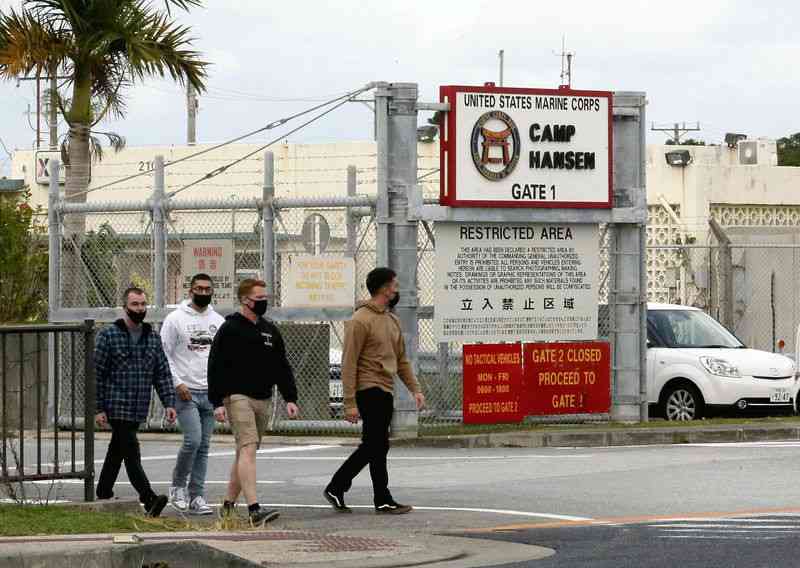
People are seen at the entrance of the U.S. Marine Corps’ Camp Hansen in Kin, Okinawa Prefecture, on Thursday.
16:27 JST, January 7, 2022
Coronavirus cases have surged in Okinawa and Yamaguchi prefectures, where U.S. military bases are located. The possibility has been raised that the omicron variant has been spreading in those areas because of the bases, via personnel who entered the country from the U.S. and other countries.
The central government’s delay in confirming the status of the U.S. forces’ infection control measures has sparked criticism among local governments.
“There’s no question that one of the major factors in the virus surge is U.S. military bases,” Okinawa Gov. Denny Tamaki said Thursday.
Since a cluster was discovered in mid-December at the U.S. Marine Corps’ Camp Hansen in the prefecture, infections have been confirmed among Japanese staff of the camp and their families.
Cases of suspected community transmission were discovered at the end of last year, and infections have increased rapidly since the start of the year.
According to the prefectural government, genome analysis conducted by the National Institute of Infectious Diseases has shown that several cases of community transmission involve the same strain of the omicron variant that has been found in samples of infected staff from Camp Hansen.
The central and prefectural governments have repeatedly asked the U.S. military to conduct thorough testing and implement lockdowns, but the response has been muted.
Lt. Gen. James Bierman, commander of the III Marine Expeditionary Force, said “containment has been successful,” in response to a related request from Tamaki on Dec. 21.
However, over Christmas and New Year’s, large groups of unmasked U.S. soldiers were seen drinking and talking loudly until midnight at restaurants in Kin, where Camp Hansen’s main base is located, according to a man linked to the town’s chamber of commerce and industry.
“Many residents are refraining from eating out or holding events, but the U.S. military’s regulations have been slack,” the man said.
The main factor in the spread of infections on bases is that U.S. military personnel are not subject to Japan’s border control measures under the Japan-U.S. Status of Forces Agreement.
U.S. personnel can enter Japan directly on military planes that land at the prefecture’s Kadena Air Base and other locations.
The Japanese and U.S. governments issued a joint press release in July 2020 following a cluster outbreak at a base, stating U.S. forces have “implemented comprehensive and rigorous health protection policies, which are consistent with the measures taken by the Japanese government to combat COVID-19 and to alleviate local concern.”
However, the U.S. military, citing the progress of vaccinations in the United States and other factors, significantly eased its measures on Sept. 3 last year, exempting personnel from PCR testing when leaving the United States for Japan — a policy far removed from Japan’s border control measures.
According to the Okinawa prefectural government, soldiers were able to move freely within their bases immediately after arriving from overseas.
The Japanese Foreign Ministry first learned of the exemption when it inquired about the U.S. military’s pandemic response in mid-December.
“We didn’t check properly. It was bad judgment,” a ministry official said.
Since late December, the U.S. military has gradually stepped up its measures, such as conducting testing before departure. On Thursday, it raised the alert level at bases and ordered personnel to wear masks.
However, Okinawa prefecture said the central government’s measures arrived too late as infections are already spreading across cities.
Masahisa Sato, director of the Liberal Democratic Party’s Foreign Affairs Division, told The Yomiuri Shimbun: “The lack of communication with the U.S. forces stationed in Japan is problematic. The Foreign Ministry bears a heavy responsibility.”
At the end of November last year, Prime Minister Fumio Kishida decided to strengthen border controls, stressing the need for thorough measures.
An official close to the prime minister said, “If the virus continues to spread, criticism against the government might increase.”
Top Articles in Society
-

Man Infected with Measles Reportedly Dined at Restaurant in Tokyo Station
-

Man Infected with Measles May Have Come in Contact with Many People in Tokyo, Went to Store, Restaurant Around When Symptoms Emerged
-

Woman with Measles Visited Hospital in Tokyo Multiple Times Before Being Diagnosed with Disease
-

Australian Woman Dies After Mishap on Ski Lift in Nagano Prefecture
-

Foreign Snowboarder in Serious Condition After Hanging in Midair from Chairlift in Nagano Prefecture
JN ACCESS RANKING
-

Japan PM Takaichi’s Cabinet Resigns en Masse
-

Japan Institute to Use Domestic Commercial Optical Lattice Clock to Set Japan Standard Time
-

Israeli Ambassador to Japan Speaks about Japan’s Role in the Reconstruction of Gaza
-

Man Infected with Measles Reportedly Dined at Restaurant in Tokyo Station
-

Videos Plagiarized, Reposted with False Subtitles Claiming ‘Ryukyu Belongs to China’; Anti-China False Information Also Posted in Japan





















